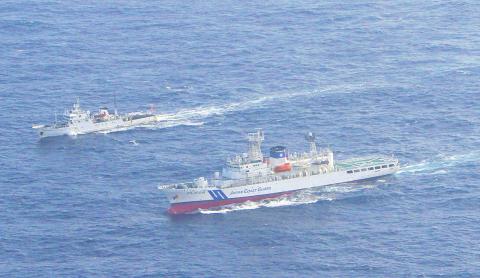China told Japan yesterday to respect its “indisputable sovereignty” over islands claimed by both countries in the East China Sea, in the latest territorial row between Beijing and its neighbors.
Chinese Foreign Minister Yang Jiechi (楊潔篪) met Japanese counterpart Koichiro Gemba in Phnom Penh where he “reaffirmed China’s principled position” on the islands known as Senkaku in Japanese and Diaoyutai (釣魚台) in Chinese, and are also claimed by Taiwan.
“He stressed that Diaoyu Islands and their affiliated islets have always been China’s territory since ancient times, over which China has indisputable sovereignty,” a statement from the Chinese delegation said.

Photo: Reuters
Japan summoned the Chinese ambassador in Tokyo as three Chinese patrol boats approached the chain of islands, which are privately held by Japanese owners.
The crew of the Chinese vessels, which have since left the islands’ immediate vicinity, initially rebuffed Japanese orders to leave, Japanese officials said.
“We are conducting official duty in Chinese waters. Do not interfere. Leave China’s territorial waters,” the Chinese crew said, according to the Japan Coast Guard.
The waters around the disputed islands have been the scene of previous rows, including the arrest of a Chinese trawlerman in late 2010.
Yesterday’s spat is the latest clash over disputed territory between China and its neighbors that threatens to overshadow attempts to smooth regional relations at an Asian security summit in Cambodia this week.
ASEAN’s 10 member countries have been trying to agree a long-stalled “code of conduct” for the South China Sea that would help settle overlapping claims in the resource-rich waterway.
The Philippines is leading a push for ASEAN to unite to persuade China to accept a code based on a UN law on maritime boundaries that would delineate the areas belonging to each country.
Manila also wants ASEAN to condemn a standoff last month between Philippine and Chinese ships over the Scarborough Shoal (Huangyan Island, 黃岩島) and also claimed by Taiwan, an outcrop in the South China Sea.
Yang urged Japan to adhere to agreements and understandings with China “in good faith” and said it should return to “the right path of managing differences through dialogue and consultation with the Chinese side.”
China’s assertiveness over disputed territories in the South China Sea, which is home to vital shipping lanes, is seen by analysts as pushing anxious neighboring countries closer to the US.
Beijing also recently angered Vietnam by inviting bids for exploration of oil blocks in contested waters, sparking protests in Hanoi.
US Secretary of State Hillary Rodham Clinton arrived in Cambodia yesterday to press for closer relations with ASEAN, part of Washington’s strategy of “pivoting” toward Asia to challenge China’s influence.

Tropical Storm Gaemi strengthened into a typhoon at 2pm yesterday, and could make landfall in Yilan County tomorrow, the Central Weather Administration (CWA) said yesterday. The agency was scheduled to issue a sea warning at 11:30pm yesterday, and could issue a land warning later today. Gaemi was moving north-northwest at 4kph, carrying maximum sustained winds near its center of up to 118.8kph and gusts of 154.8kph. The circumference is forecast to reach eastern Taiwan tomorrow morning, with the center making landfall in Yilan County later that night before departing from the north coast, CWA weather forecaster Kuan Shin-ping (官欣平) said yesterday. Uncertainty remains and

SEA WARNING LIKELY: The storm, named Gaemi, could become a moderate typhoon on Wednesday or Thursday, with the Taipei City Government preparing for flooding A tropical depression east of the Philippines developed into a tropical storm named Gaemi at 2pm yesterday, and was moving toward eastern Taiwan, the Central Weather Administration (CWA) said. Gaemi could begin to affect Taiwan proper on Tuesday, lasting until Friday, and could develop into a moderate typhoon on Wednesday or Thursday, it said. A sea warning for Gaemi could be issued as early as Tuesday morning, it added. Gaemi, the third tropical storm in the Pacific Ocean this typhoon season, is projected to begin moving northwest today, and be closest to Taiwan on Wednesday or Thursday, the agency said. Today, there would likely

DISRUPTIONS: The high-speed rail is to operate as normal, while several airlines either canceled flights or announced early departures or late arrivals Schools and offices in 15 cities and counties are to be closed today due to Typhoon Gaemi, local governments announced last night. The 15 are: Taipei, New Taipei City, Taoyuan, Tainan, Keelung, Hsinchu and Kaohsiung, as well as Yilan, Hualien, Hsinchu, Miaoli, Chiayi, Pingtung, Penghu and Lienchiang counties. People should brace for torrential rainfall brought by the storm, with its center forecast to make landfall on the east coast between tonight and tomorrow morning, the Central Weather Administration (CWA) said. The agency issued a sea warning for the typhoon at 11:30pm on Monday, followed by a land warning at 11:30am yesterday. As of

CASUALTY: A 70-year-old woman was killed by a falling tree in Kaohsiung as the premier warned all government agencies to remain on high alert for the next 24 hours Schools and offices nationwide are to be closed for a second day today as Typhoon Gaemi crosses over the nation, bringing torrential rain and whipping winds. Gaemi was forecast to make landfall late last night. From Tuesday night, its outer band brought substantial rainfall and strong winds to the nation. As of 6:15pm last night, the typhoon’s center was 20km southeast of Hualien County, Central Weather Administration (CWA) data showed. It was moving at 19kph and had a radius of 250km. As of 3pm yesterday, one woman had died, while 58 people were injured, the Central Emergency Operation Center said. The 70-year-old